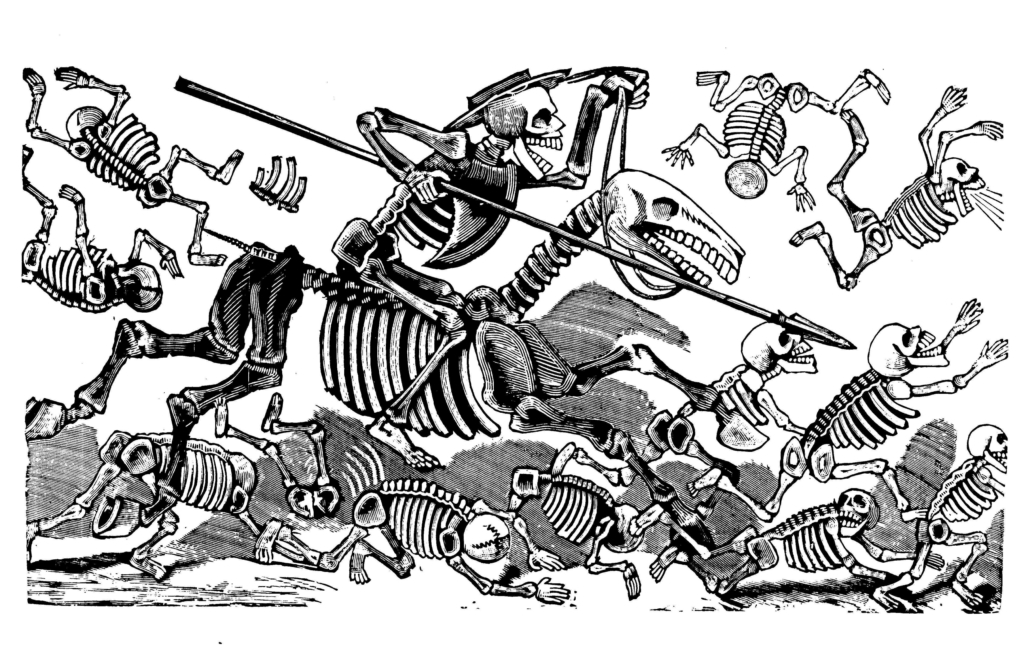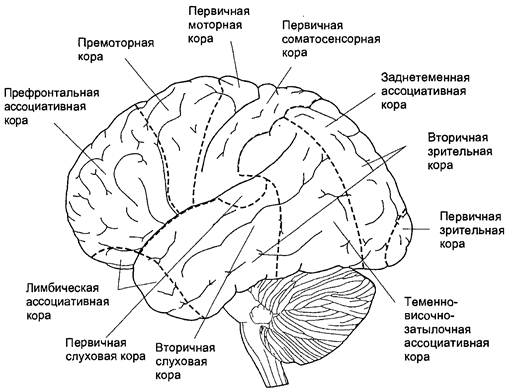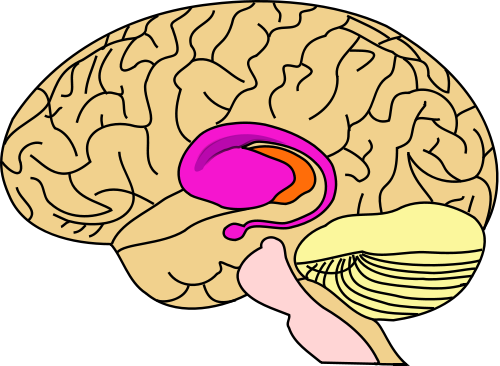Target as an antidepressant
In order to fight depressions with the help of goals, it is necessary to first determine the question: what is depression?
 "Calavera of Don Quixote" 1985, by José Posada
"Calavera of Don Quixote" 1985, by José Posada
Depression is the psychophysical state of a person, about which it is not yet precisely known what it is. But it’s already clear how to fight it and make life easier for people.
The entrance to the depression, as well as the exit from it, can be provoked by a minor trifle. But in fact, everything is more complicated: the violation of the production of hormones and neurotransmitters inhibits the work of some parts of the brain and their interaction.
The general sponsor of the article is the neurotransmitter dopamine .
Dopamine will increase the sense of joy and increase the pleasure of life, and also help to overcome bad habits.
Before reading the article, consult with common sense.
The manifestation of depression can be varied, but the long-term manifestation of certain symptoms indicate its presence: insomnia or drowsiness, chronic fatigue, significant weight changes, sadness, irritability, depressed mood, loss of interest in work or hobby, a sense of worthlessness, thoughts of death or suicide .
')
If these symptoms appear within two weeks, then you are most likely depressed or close to that. The more symptoms appear, the more pronounced the disease.
It is best to contact a specialist, but even working with goals can help you and alleviate the condition.
One of the symptoms of depression is that any solution seems wrong. Especially often it occurs when there is a lack of information. The reason for the limbic system of the brain , or rather, is that it suppresses the prefrontal cortex . And this symptom speaks about the stability of depression.

Trying to make a better decision, we evaluate different options, as a result, we consider their shortcomings and even more we are disappointed in them.
The problem is that usually we do not have enough information to make a better decision - the world around is too complicated and changeable.
In pursuit of perfectionism, we activate the ventromedial zone of the prefrontal cortex, which is responsible for emotions. Taking a fairly good decision - the dorsolateral zone of the prefrontal cortex, responsible for rationality.
All three links — intention, goal setting, and decision making — are controlled by neural circuits alone, activate the prefrontal cortex, and reduce anxiety and anxiety. Decision making also affects the other part of the brain - the striatum , reducing its activity, since it controls impulses and habits.

Purple-orange "tadpole" - striped body
The human person and the brain are complex objects, and three brain regions are involved in making even a simple decision.
Our indecision manifests itself due to the diversity of tastes and preferences, if we loved one thing, it would be easy to decide.
When deciding for brain resources, our goals, habits, fears, and desires fight. Sometimes the relationship between parts of the brain slows down, and then we can’t decide for a long time. At other times, too obsessive.
Moments of indecision strongly influence our mood and thoughts, and this gives rise to new anxieties and excitements. They increase our indecision, and it turns out a vicious circle leading to depressive states.
The brain works on the principle of "use, or lose," as well as muscles. With long inaction, the brain begins to degrade, and with constant use, on the contrary strengthened.
The prefrontal cortex, and especially the ventromedial zone, is responsible for making decisions, and neural chains that improve the psycho-emotional state are involved.
This particular area of the brain is responsible for purposeful behavior.
Some situations may seem unresolvable, but this is not the case - sometimes you cannot see solutions due to overloading with details that are irrelevant to the cause, such as advertising.
Often our brains give answers not in a conscious form, but in the form of tooltips. For their occurrence is usually enough solid solutions to resolve the situation.
The main problem of depression is no joy in life. This is due to the violation of the interaction of the prefrontal cortex and the limbic system, as a result - it is not possible to connect future happiness with current actions. But if a person actively pursues a goal and does not rely on chance, but rather on impulses or habits - this gives a more tangible joy. Setting a goal and achieving it increases the inflow of dopamine, and it increases the pleasure from life and the feeling of joy.
When making a decision, concentrate on what you want, and not on what you want to avoid. Otherwise, the decision-making process will be much more difficult.
With an independent solution, excitation is noted in the anterior cingulate cortex of the brain, in the insular cortex and the nucleus accumbens. It also increases the activity of neural circuits responsible for the attention and production of dopamine.
When a long-term goal is reached, dopamine is produced, but the goal achievement itself is less significant than the fact of its setting.
People prone to depressions usually set ambiguous, poorly worded goals, which makes their achievement problematic. With an unclear and blurred goal, it is difficult for the brain to understand whether it is being achieved or not, and whether there is movement in the right direction. This leads to a decrease in dopamine production and can have a demoralizing effect.
A person needs to have several goals, the achievement of which he will believe, otherwise the lack of faith in the ability and ability to achieve anything reinforces the feeling of hopelessness.
Suppose we can not take only the right decisions, but our brain works more efficiently, controlling the world around us. Indecision strengthens the feeling of lack of control over the situation.
The more we control the situation, the lower the level of stress will be.
When we are not free in our actions, everything gets out of control, but here it’s good that you can start small: choose a dinner or a TV series for the evening.
Decisiveness in some areas of life will increase determination in others. Choose, set goals, stick to your choice and do not hesitate.
Every time we make a decision, we loop back the situation, and thereby strengthen the neural chains responsible for making decisions.
If you have to make many decisions in a row, the neutron paths responsible for this will “get tired”, and the brain will approach a state of fatigue and impulsivity. But do not get upset - so we create the conditions for movement to the exit from depressive states.
I hope the information was useful for you and will help in life. Make decisions, set goals and achieve them. And yes, dopamine will be with you!

Read more articles on our blog: SmartTalks
A source:
On the publisher site
 "Calavera of Don Quixote" 1985, by José Posada
"Calavera of Don Quixote" 1985, by José PosadaDepression is the psychophysical state of a person, about which it is not yet precisely known what it is. But it’s already clear how to fight it and make life easier for people.
The entrance to the depression, as well as the exit from it, can be provoked by a minor trifle. But in fact, everything is more complicated: the violation of the production of hormones and neurotransmitters inhibits the work of some parts of the brain and their interaction.
The general sponsor of the article is the neurotransmitter dopamine .
Dopamine will increase the sense of joy and increase the pleasure of life, and also help to overcome bad habits.
Before reading the article, consult with common sense.
The manifestation of depression can be varied, but the long-term manifestation of certain symptoms indicate its presence: insomnia or drowsiness, chronic fatigue, significant weight changes, sadness, irritability, depressed mood, loss of interest in work or hobby, a sense of worthlessness, thoughts of death or suicide .
')
If these symptoms appear within two weeks, then you are most likely depressed or close to that. The more symptoms appear, the more pronounced the disease.
It is best to contact a specialist, but even working with goals can help you and alleviate the condition.
About the importance of decision making
One of the symptoms of depression is that any solution seems wrong. Especially often it occurs when there is a lack of information. The reason for the limbic system of the brain , or rather, is that it suppresses the prefrontal cortex . And this symptom speaks about the stability of depression.

You have to make decisions, even if they are wrong. If you stop making decisions, you are doomed.
Joe Simpson "Touching the Void"
It is not always necessary to make the best decision, most often just good enough
Trying to make a better decision, we evaluate different options, as a result, we consider their shortcomings and even more we are disappointed in them.
The problem is that usually we do not have enough information to make a better decision - the world around is too complicated and changeable.
In pursuit of perfectionism, we activate the ventromedial zone of the prefrontal cortex, which is responsible for emotions. Taking a fairly good decision - the dorsolateral zone of the prefrontal cortex, responsible for rationality.
All three links — intention, goal setting, and decision making — are controlled by neural circuits alone, activate the prefrontal cortex, and reduce anxiety and anxiety. Decision making also affects the other part of the brain - the striatum , reducing its activity, since it controls impulses and habits.

Purple-orange "tadpole" - striped body
Why is difficult to solve
The human person and the brain are complex objects, and three brain regions are involved in making even a simple decision.
Our indecision manifests itself due to the diversity of tastes and preferences, if we loved one thing, it would be easy to decide.
When deciding for brain resources, our goals, habits, fears, and desires fight. Sometimes the relationship between parts of the brain slows down, and then we can’t decide for a long time. At other times, too obsessive.
Moments of indecision strongly influence our mood and thoughts, and this gives rise to new anxieties and excitements. They increase our indecision, and it turns out a vicious circle leading to depressive states.
Prefrontal cortex and decision making
The brain works on the principle of "use, or lose," as well as muscles. With long inaction, the brain begins to degrade, and with constant use, on the contrary strengthened.
The prefrontal cortex, and especially the ventromedial zone, is responsible for making decisions, and neural chains that improve the psycho-emotional state are involved.
This particular area of the brain is responsible for purposeful behavior.
Some situations may seem unresolvable, but this is not the case - sometimes you cannot see solutions due to overloading with details that are irrelevant to the cause, such as advertising.
Often our brains give answers not in a conscious form, but in the form of tooltips. For their occurrence is usually enough solid solutions to resolve the situation.
To reduce stress when making decisions, focus on what is really important to you.
Solutions and joy
The main problem of depression is no joy in life. This is due to the violation of the interaction of the prefrontal cortex and the limbic system, as a result - it is not possible to connect future happiness with current actions. But if a person actively pursues a goal and does not rely on chance, but rather on impulses or habits - this gives a more tangible joy. Setting a goal and achieving it increases the inflow of dopamine, and it increases the pleasure from life and the feeling of joy.
When making a decision, concentrate on what you want, and not on what you want to avoid. Otherwise, the decision-making process will be much more difficult.
With an independent solution, excitation is noted in the anterior cingulate cortex of the brain, in the insular cortex and the nucleus accumbens. It also increases the activity of neural circuits responsible for the attention and production of dopamine.
We not only choose things that we like. We also love the things we choose.
Goal setting enhances dopamine production
When a long-term goal is reached, dopamine is produced, but the goal achievement itself is less significant than the fact of its setting.
People prone to depressions usually set ambiguous, poorly worded goals, which makes their achievement problematic. With an unclear and blurred goal, it is difficult for the brain to understand whether it is being achieved or not, and whether there is movement in the right direction. This leads to a decrease in dopamine production and can have a demoralizing effect.
A person needs to have several goals, the achievement of which he will believe, otherwise the lack of faith in the ability and ability to achieve anything reinforces the feeling of hopelessness.
Suppose we can not take only the right decisions, but our brain works more efficiently, controlling the world around us. Indecision strengthens the feeling of lack of control over the situation.
The more we control the situation, the lower the level of stress will be.
Fundamental is not real control over the situation, but imaginary - it increases self-confidence and improves mood.
Learning to make decisions for decision making
Ending college, I myself could not determine what I still wanted from life. Soon my indecisiveness led to difficulties in choosing any plan: I could not figure out what I wanted from the summer, and then from the next weekend.
Alex Korb
When we are not free in our actions, everything gets out of control, but here it’s good that you can start small: choose a dinner or a TV series for the evening.
Decisiveness in some areas of life will increase determination in others. Choose, set goals, stick to your choice and do not hesitate.
Every time we make a decision, we loop back the situation, and thereby strengthen the neural chains responsible for making decisions.
If you have to make many decisions in a row, the neutron paths responsible for this will “get tired”, and the brain will approach a state of fatigue and impulsivity. But do not get upset - so we create the conditions for movement to the exit from depressive states.
I hope the information was useful for you and will help in life. Make decisions, set goals and achieve them. And yes, dopamine will be with you!

Read more articles on our blog: SmartTalks
A source:
- “Rising spiral. How neurophysiology helps to cope with negative and depression - step by step »Alex Korb
- Original: "The Upward Spiral: One Thinking"
On the publisher site
Source: https://habr.com/ru/post/320922/
All Articles